 Petzlover
Petzlover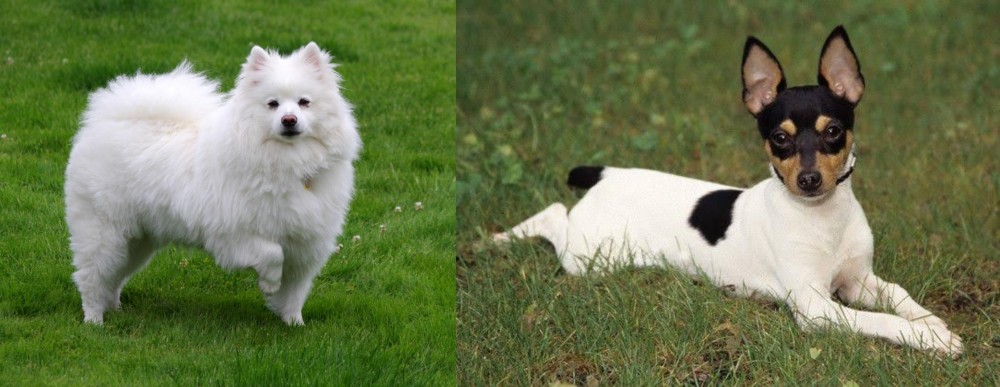 Both American Eskimo Dog and Toy Fox Terrier are originated from United States. American Eskimo Dog may grow 19 cm / 8 inches higher than Toy Fox Terrier. American Eskimo Dog may weigh 12 kg / 27 pounds more than Toy Fox Terrier. Both American Eskimo Dog and Toy Fox Terrier has almost same life span. Both American Eskimo Dog and Toy Fox Terrier has almost same litter size. American Eskimo Dog requires High Maintenance. But Toy Fox Terrier requires Low Maintenance
Both American Eskimo Dog and Toy Fox Terrier are originated from United States. American Eskimo Dog may grow 19 cm / 8 inches higher than Toy Fox Terrier. American Eskimo Dog may weigh 12 kg / 27 pounds more than Toy Fox Terrier. Both American Eskimo Dog and Toy Fox Terrier has almost same life span. Both American Eskimo Dog and Toy Fox Terrier has almost same litter size. American Eskimo Dog requires High Maintenance. But Toy Fox Terrier requires Low Maintenance
 The American Eskimo is derived from the Nordic Spitz breed and most closely related to the German Spitz in particular. There were many German Spitzes in the United States at the time of the second World War and anti-German sentiment caused its name to change to the American Eskimo Dog. However, as the breed developed over time in the States, the American Eskimo became its own separate breed. In addition to the German Spitz, the American Eskimo is also related to the white Keeshond, the Samoyed, the white Italian Spitz and the white Pomeranian.
The history is beginning to show that the Spitzes that were brought to the US in the early 1900’s was white. This color was not popular in Europe but was quickly the favorite in the United States. They were originally working dogs on farms and ranches. They have excellent herding instincts, make goo watch and guard dogs, and good law enforcement sniff dogs. However, their first introduction to the American public was through the Cooper Brothers’ Railroad Circus and Stout’s Pal Pierre at the Barnum and Baily Circus. Eskimo puppies were sold after the circus show.
The American Eskimo is derived from the Nordic Spitz breed and most closely related to the German Spitz in particular. There were many German Spitzes in the United States at the time of the second World War and anti-German sentiment caused its name to change to the American Eskimo Dog. However, as the breed developed over time in the States, the American Eskimo became its own separate breed. In addition to the German Spitz, the American Eskimo is also related to the white Keeshond, the Samoyed, the white Italian Spitz and the white Pomeranian.
The history is beginning to show that the Spitzes that were brought to the US in the early 1900’s was white. This color was not popular in Europe but was quickly the favorite in the United States. They were originally working dogs on farms and ranches. They have excellent herding instincts, make goo watch and guard dogs, and good law enforcement sniff dogs. However, their first introduction to the American public was through the Cooper Brothers’ Railroad Circus and Stout’s Pal Pierre at the Barnum and Baily Circus. Eskimo puppies were sold after the circus show.
It was then that the breed became one of America’s favorite breeds and they quickly became house pets. Following World War II, Japan exported the Japanese Spitz into America and it was crossed with the Eskimo also. The American Eskimo Dog breed was not recognized by AKC until 1985. Still in 1958 there was no official breed club in the States but there were growing numbers of the dogs. It was not until 1970 did the National American Eskimo Dog Association (NAEDA) come into being. They collected the pedigrees of the first 1750 dogs to be AKC registered.
Since the American Eskimo Dog is not recognized internationally, those wishing to participate in international competition such as England’s prestigious Cruft’s Dog Show must register their dogs a German Spitz. Despite this the American Eskimo and German Spitz remain two very different breeds.
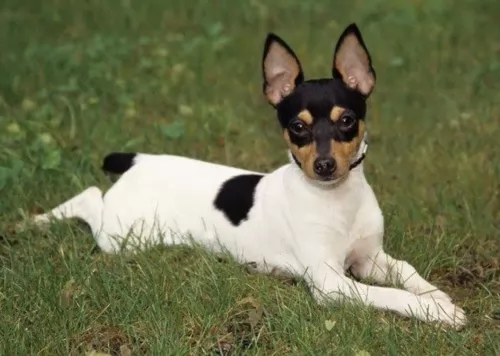 The small Toy Fox Terrier was developed in the United States of America and is a smaller look-alike of the larger Smooth Fox Terrier.
The small Toy Fox Terrier was developed in the United States of America and is a smaller look-alike of the larger Smooth Fox Terrier.
Several toy breeds as well as the Smooth Fox Terrier were used to bring about the small Terrier dog.
Small though they are, they have had a role to play, particularly on farms where they've been used as ratters. They’ve also been used in circuses to perform tricks. These days they excel as being devoted companions of their human masters. These dogs are recognized by the United Kennel Club (UKC).
 This small to medium dog is beautiful and resembles a miniature Samoyed. There are three sizes of American Eskimo – the standard, miniature, and the toy. The Eskimo’s head is wedge shaped with tall, triangular, erect ears. It has a heavily plumed tail with a sharp curl over the back. The Eskimo can burst into bold action due to their good legs and feet.
This small to medium dog is beautiful and resembles a miniature Samoyed. There are three sizes of American Eskimo – the standard, miniature, and the toy. The Eskimo’s head is wedge shaped with tall, triangular, erect ears. It has a heavily plumed tail with a sharp curl over the back. The Eskimo can burst into bold action due to their good legs and feet.
The coat is a double one with a harsh outer coat and plush inner one. The coat is always white or white with cream or biscuit markings, and visible skin in gray or pink. The American Eskimo’s ruff or mane is very heavy, and the nose, eyelids, pads and gums are black. They have dark eyes and blue are not allowed.
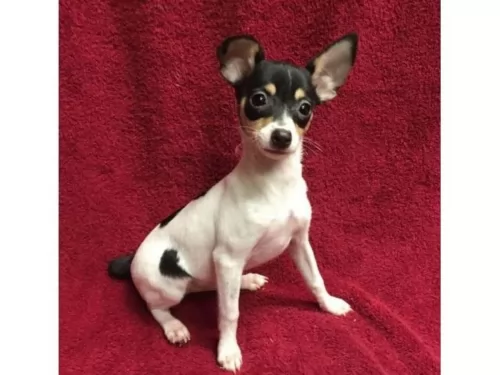 The Toy Fox Terrier stands at between 22 – 29cm in height and weighs between 1.5 and 4kg. He is squarely built, with alert, dark eyes, and large, erect ears.
The Toy Fox Terrier stands at between 22 – 29cm in height and weighs between 1.5 and 4kg. He is squarely built, with alert, dark eyes, and large, erect ears.
The high set tail is nearly always docked. The coat of this dog is short and smooth and it sheds moderately. Color is mostly white with tan or black markings. The face is nearly always black and tan.
His body is lean, lithe and muscular and gives the impression of being well-groomed. The females give birth to between 2 and 6 puppies with the gestation period being 60-64 days. Have your dog spayed to avoid unwanted puppies.
Toy Fox Terriers are loyal, protective dogs and they make excellent watchdogs in terms of barking a lot when needed.
He is such a sport and wants to be part of all the activities that his human family are busy with. They make great playmates for older children, but care should be taken with toy breeds and small, undisciplined children who could hurt them.
These dogs also get on well with other pets in the home and they can adapt easily to life in the city or the countryside. He isn’t the brightest dog, but intelligent enough to learn some basic commands.
His deep loyalty to his human family makes him a little bit aloof with strangers. While he is eager to please, he also has a mind of his own and this is when training and socialization turn him into an obedient little dog.
He has loads of energy too and will rely on his human owners to take him on walks and play ball games with him.
 The Eskimo is affectionate, playful and love children of all ages. They are intelligent and want to please you. They can be trained easily and are champions of the obedience trial. They are fun and confident. At the same time, they need a confident pack leader. He is prone to Little Dog Syndrome where the dog thinks they oversee the home and display all sorts of behaviors. Under these circumstances the American Eskimo can become obsessive, aggressive, and engaging in obsessive resource guarding and barking.
The Eskimo is affectionate, playful and love children of all ages. They are intelligent and want to please you. They can be trained easily and are champions of the obedience trial. They are fun and confident. At the same time, they need a confident pack leader. He is prone to Little Dog Syndrome where the dog thinks they oversee the home and display all sorts of behaviors. Under these circumstances the American Eskimo can become obsessive, aggressive, and engaging in obsessive resource guarding and barking.
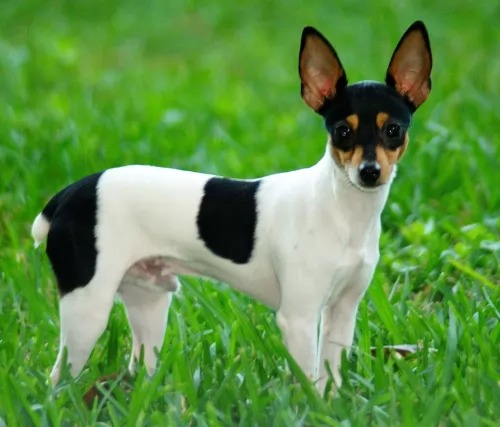 Small and spunky, the Toy Fox Terrier is such an entertaining little pet, full of beans and curiosity.
Small and spunky, the Toy Fox Terrier is such an entertaining little pet, full of beans and curiosity.
He has sharp eyes and his hearing is good and this makes him a good watchdog. He is independent and intelligent, playful and jaunty.
When you allow one of these little dogs into your home, you’ll wonder how you ever got by without one, as he promises to be loving and loyal throughout your friendship with him.
 The American Eskimo Dog is prone to hip dysplasia. Their eyes and tear ducts are potential issues with progressive retinal atrophy. They are allergic to fleas and have a tendency to be overweight.
The American Eskimo Dog is prone to hip dysplasia. Their eyes and tear ducts are potential issues with progressive retinal atrophy. They are allergic to fleas and have a tendency to be overweight.
We deal with PRA (Progressive Retinal Atrophy) in greater detain in a following section but it is not as destructive as it used to be. It is much more treatable now.
There are potentially some dental issues that some American Eskimo Dogs are prone to.
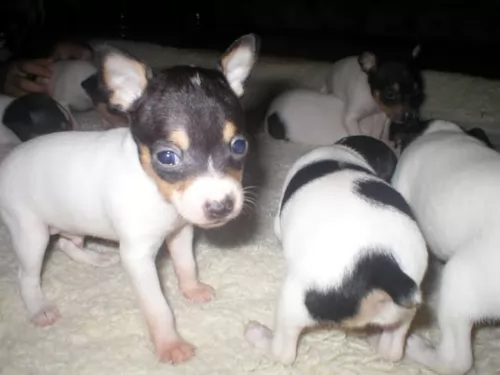 Toy Fox Terriers are generally healthy, but like all breeds, they're prone to certain health conditions.
Toy Fox Terriers are generally healthy, but like all breeds, they're prone to certain health conditions.
It is highly unlikely he’ll get any of the common dog illnesses there are if he is looked after well, but he could.
This is a common dog disease of small breeds, and it is very similar to hip dysplasia. Problems with the femur causes wear and tear with arthritis coming about as well.
 Your American Eskimo Dog needs a high quality food so they will not get overweight. Make sure you know how much is appropriate for your particular dog and her specific age. The puppies should be fed twice a day but adults only once.
Your American Eskimo Dog needs a high quality food so they will not get overweight. Make sure you know how much is appropriate for your particular dog and her specific age. The puppies should be fed twice a day but adults only once.
As previously mentioned the American Eskimo Dog is prone to eye issue such as Progressive Retinal Atrophy or (PRA) – this disease is inherited and used to cause blindness as the rods in the retina died. New medical discoveries mean this is no longer a hopeless disease. Their eyes are also susceptible to other issues so make sure you check them and the tear ducts regularly.
Like so many other breeds the American Eskimo is also susceptible to hip dysplasia and a moving patella in the knee. For this reason watch their weight. They can also be very allergic.
This small dog has more energy than his size can handle. He needs a lot of exercise and a place to run. If he will become hyperactive and destructive. They are prone to disturbing behaviors such as spinning (spinning in circles) when they don’t get enough exercise. The American Eskimo Dog is smart and agile, Play games like catch or agility. They are also great at herding, competitive obedience or detection.
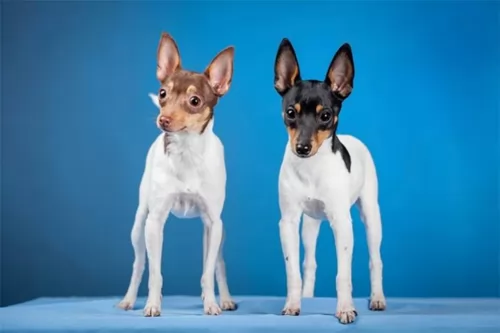 This little dog is essentially a companion. Just like people get these little dogs to be a companion, the dog also needs to receive proper care too.
This little dog is essentially a companion. Just like people get these little dogs to be a companion, the dog also needs to receive proper care too.
Make sure your pet gets the right amount of food and also the right type of food. He’ll need food rich in vitamins and minerals. He’ll also benefit from wholesome home-made food – boiled chicken, brown rice, sweet potato, spinach and carrots – simple, harmless foods like that.
Don’t be tempted to pop peanuts, chocolates, grapes, onions and other human foods into his mouth as it can give your pet a stomach ache and diarrhea.
Get your pet to the vet if he’s sick. He’ll need vaccines too to prevent some of the deadly canine diseases there are.
Provide your pet with adequate games and other forms of exercise. Exercise is essential for good health.
Spay or neuter your dog to avoid an unwanted litter of puppies. There are health benefits to having this done too.
Groom your small dog regularly and get rid of those loose hairs. With his short hair, the Toy Fox Terrier is considered to be a low maintenance dog.